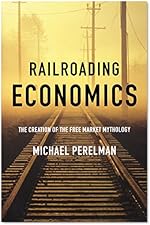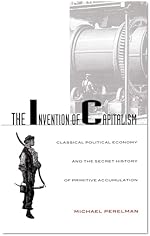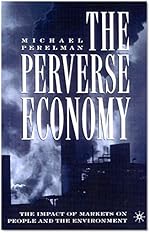Archive for January, 2008|Monthly archive page
more on time in a capitalist economy
Part of what interested me in the article was the time requirement to find the best price. Economists tell us that prices are supposed to be signals indicating how utility can be produced with the least opportunity costs. In this sense, exploring alternative prices can be seen as a productive activity. Here, the problem is that business is creating an artificial need to muck around to find the best price.
Parents take eggs out of the refrigerator to hide them on Easter, because children enjoy looking for them. This article suggests that the stores are wasting their own energies manipulating prices in order that they can make potential customers chase around for the best deal.
Time in a capitalist economy
The American Economic Review has a fascinating article that inadvertently points to a relatively insecure, but significant negative consequence of capitalism. The authors find: “Specifically, households in their late forties pay, on average, 4 percent more for identical goods than households in their late sixties. This is consistent with the fact that market labor hours, earnings, and time demands from children all decline after middle age. Additionally, we document that higher-income households pay higher prices than lower-income households, and dualworker couples pay higher prices than singleworker couples.”
Continue reading
Thoughts on Credit in the United States Economy
I’m far from an expert on credit, so I’m posting this, hoping that some of you may contribute to my education.
My understanding is that most families avoided borrowing for consumer goods, except for pianos and encyclopedias, which were considered moral consumption. Then in the 1920s, the automobile industry, facing a stagnating market, encouraged consumers to purchase automobiles on credit.
The Depression and the unavailability of consumer goods during the war left most families in the United States without much of a credit burden. Over time, an increasing share of consumption depended on credit, the absence of which would have limited economic growth.
After the early 1970s, when the great burst of inequality began, the dependence on credit as an engine of economic growth became more extreme.
Regulatory Neglect and the Subprime Mortgage Crisis
Until a recent Washington Post op-ed piece, I was unaware that the federal government, in particular the Treasury Department’s Office of the Comptroller of the Currency, had put an end to state regulations that might have prevented many of the subprime mortgage abuses. (see below). Continue reading
Bank Failures in Second Life
I have never seen how Second Life works, but I am fascinated by the game’s connections with the real economy — often replicating some of its worst aspects. For example, players hire people in China to make play money for them & then sell the play money for real dollars — a relatively obvious production of surplus value.
The Wall Street Journal just published an article about bank frauds and failures within the game.
Here are some extracts from the article: Continue reading
Andy Carnegie and Bill Gates
There is an interesting difference between the two. Gates is a recent convert to philanthropy. Carnegie, however, began at an early age. He decided that he would make a fortune and use it to contribute to a better world.
Carnegie came from a family of radical Chartists. Philanthropy was his way of being radical. So, he felt justified in screwing anybody — even sanctioning the bloody battle of Homestead to promote his philanthropy.
209: “… there are higher uses for surplus wealth than adding petty sums to the earnings of the masses. Trifling sums given to each every week or month — and the sums would be trifling indeed — would be frittered away, nine times out of 10, in things which pertain to the body and not to the spirit; upon richer food and drink, better clothing, more extravagant living, which are beneficial neither too rich or poor.”
Carnegie, Andrew. 1895. “The Best Use of Wealth.” in Miscellaneous Writings of Andrew Carnegie, 2 vols. Burton J. Hendrick, ed. (Garden City, NY: Doubleday, Doran & Company, 1933): pp. 203-18.
The Two Faces of Bill Gates
Gates just gave a speech advocating a kindler, gentler capitalism, posing a good brother to the poor. At the same time, Microsoft is embarking on the most far reaching monitoring of workers ever contrived in which wireless sensors could read “heart rate, galvanic skin response, EMG, brain signals, respiration rate, body temperature, movement facial movements, facial expressions and blood pressure”, the application states. The system could also “automatically detect frustration or stress in the user” and “offer and provide assistance accordingly”.
Guth, Robert A. 2008. “Bill Gates Issues Call for Kinder Capitalism: Famously Competitive, Billionaire Now Urges Business to Aid the Poor.” Wall Street Journal (24 January): p. A 1.
“In a speech at the World Economic Forum in Davos, Switzerland, the software tycoon plans to call for a “creative capitalism” that uses market forces to address poor-country needs that he feels are being ignored. “We have to find a way to make the aspects of capitalism that serve wealthier people serve poorer people as well,” Mr. Gates will tell world leaders at the forum, according to a copy of the speech seen by The Wall Street Journal. Mr. Gates isn’t abandoning his belief in capitalism as the best economic system. But in an interview with the Journal last week at his Microsoft office in Redmond, Wash., Mr. Gates said that he has grown impatient with the shortcomings of capitalism”.” Continue reading
Why to Tax the Rich: How the Rich Get Richer
The Ken Griffin interview got me to think about some earlier contributions about his thinking.
A Pennsylvania businessman wrote a book with a revealing title.
Farquhar, A. B. in collaboration with Samuel Crowther. 1922. The First Million is the Hardest: An Autobiography (Garden City, NJ: Doubleday): p. 19.
Andrew Carnegie’s rumination throw light on this subject:
2 & 15: “wealth has been produced as if by magic, and fallen largely to the captains of industry, greatly to their own surprise …. The community created the millionaire’s wealth. While he slept it grew as fast as when he was awake.”
Carnegie, Andrew. 1906. “Wealth.” in Problems of To-day: Wealth, Labor, Socialism (Garden City, NY: Doubleday, Doran, 1933): pp. 1-39.
Why We Should Not Tax the Rich
Here is John Edwards’ “employer” on taxes. The last line, as they say, is “priceless.” Griffin is an exception, since he is not interested in money, but in creating wealth for the community and the sheer joy of working. Also, he would work less if faced with high taxes, but only as a matter of principle (or is it principal?).
“Kenneth C. Griffin, who received more than $1 billion last year as chairman of a hedge fund, the Citadel Investment Group, declared: “The money is a byproduct of a passionate endeavor.” Mr. Griffin, 38, argued that those who focus on the money — and there is always a get-rich crowd — “soon discover that wealth is not a particularly satisfying outcome.” His own team at Citadel, he said, “loves the problems they work on and the challenges inherent to their business.” Mr. Griffin maintained that he has created wealth not just for himself but for many others. “We have helped to create real social value in the U.S. economy,” he said. “We have invested money in countless companies over the years and they have helped countless people”.”
“The income distribution has to stand,” Mr. Griffin said, adding that by trying to alter it with a more progressive income tax, “you end up in problematic circumstances. In the current world, there will be people who will move from one tax area to another. I am proud to be an American. But if the tax became too high, as a matter of principle I would not be working this hard.”
Uchitelle, Louis. “The Richest of the Rich, Proud of a New Gilded Age.” New York Times (15 July).
http://www.nytimes.com/2007/07/15/business/15gilded.html?sq=&pagewanted=print
Frontiers of Cost-Benefit Calculations
A little more than a year ago, in response to a Wall Street Journal article on airline travelers’ lost luggage, an insightful reader offered a more in depth analysis:
“Airlines lose luggage because there is no incentive to correct the problem. It would cost money to fix the broken systems, and there is no meaningful penalty on airlines that lose baggage because our government allows airlines to pay pennies on the dollar for what is lost. Even worse, the threat of lost luggage actually benefits the airlines by forcing passengers to avoid checking luggage.”
Armstrong, Arthur O. 2007. “Perpetual Curse of Lost Luggage.” Wall Street Journal (27 January): p. A 5.
 Leave a comment
Leave a comment
 25 – The Confiscation of American Prosperity: From Right-Wing Extremism and Economic Ideology to the Next Great Depression
25 – The Confiscation of American Prosperity: From Right-Wing Extremism and Economic Ideology to the Next Great Depression 30 – Manufacturing Discontent: The Trap of Individualism in Corporate Society
30 – Manufacturing Discontent: The Trap of Individualism in Corporate Society Class Warfare in the Information Age
Class Warfare in the Information Age Railroading Economics: The Creation of the Free Market Mythology
Railroading Economics: The Creation of the Free Market Mythology Steal This Idea: Intellectual Property Rights and the Corporate Confiscation of Creativity
Steal This Idea: Intellectual Property Rights and the Corporate Confiscation of Creativity The Invention of Capitalism: Classical Political Economy and the Secret History of Primitive Accumulation
The Invention of Capitalism: Classical Political Economy and the Secret History of Primitive Accumulation The Perverse Economy: The Impact of Markets on People and the Environment
The Perverse Economy: The Impact of Markets on People and the Environment